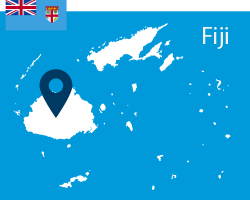Fiji includes the other 3 cultural groups called Fijians -Rotuma, Rabi, and Kioa (Rabian and Kioans) were resettled in Fiji after being evacuated from Ocean islands, Tuvalu and Kiribati).
It is a destination attraction for its coral reefs, clear lagoons, and tropical landscapes. Fijian indigenous society is very communal, with great importance attached to the family unit, the village, and the vanua (land). With the introduction of traditions such as Indian and Chinese and significant influences from Europe and Fiji's Pacific neighbours, particularly Tonga and Samoa, these various cultures have come together to create a multicultural national identity for Fiji.
Fiji has several development goals they are focusing on as a country such as lowering youth unemployment rates, reducing poverty, reducing child mortality and gender inequality, increasing environmental sustainability, and improving the health and education status of its citizens.
Our Impact
We began volunteering in Fiji in 1966 with a programme focused on education and agriculture. A series of military coups has characterized the political climate since the 1980s, and from 1998 VSA discontinued working in Fiji.
Since 2013 however, we began sending volunteers to Fiji again through our Business Development partnerships with international agencies. One of our key partner organisations based in Fiji is UN Women. VSA volunteers have supported this organisation working in climate change, Convention for Ending Discrimination Against Women (CEDAW) reporting, communications, monitoring and evaluation and ending violence against women.
As part of these activities, volunteers have enhanced reporting across the Pacific on CEDAW, Ending Violence Against Women (EVAW) initiatives, and an instant data collection system to collate ideas for positive impacts for women vendors of the Pacific.
Together, we support gender equity, gender governance, women’s economic empowerment and access to geothermal energy for the Pacific region.
VSA does not currently have a field office in Fiji.


